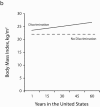Disentangling the effects of racial and weight discrimination on body mass index and obesity among Asian Americans
- PMID: 18235065
- PMCID: PMC2253588
- DOI: 10.2105/AJPH.2007.114025
Disentangling the effects of racial and weight discrimination on body mass index and obesity among Asian Americans
Abstract
Objectives: We examined whether racial discrimination is associated with increased body mass index (BMI) and obesity among Asian Americans. Further, we explored whether this association strengthens with increasing time in the United States.
Methods: We analyzed data from the 2002 to 2003 National Latino and Asian American Study (n=1956). Regression models tested whether reports of racial discrimination were associated with BMI and obesity, after accounting for weight discrimination, age, gender, marital status, ethnicity, generation, employment, health status, and social desirability bias (the tendency to seek approval by providing the most socially desirable response to a question).
Results: We found that (1) racial discrimination was associated with increased BMI and obesity after we controlled for weight discrimination, social desirability bias, and other factors and (2) the association between racial discrimination and BMI strengthened with increasing time in the United States.
Conclusions: Racial discrimination may be an important factor related to weight gain among ethnic minorities.
Figures


References
-
- McEwen BS. Protective and damaging effects of stress mediators. N Engl J Med. 1998;338:171–179. - PubMed
-
- Bjorntorp P. Do stress reactions cause abdominal obesity and comorbidities? Obes Rev. 2001;2:73–86. - PubMed
-
- Rosmond R, Dallman M, Bjorntorp P. Stress-related cortisol secretion in men: relationships with abdominal obesity and endocrine, metabolic and hemodynamic abnormalities. J Clin Endocrinol Metab. 1998;83:1853–1859. - PubMed
-
- Dallman MF, Pecoraro NC, la Fleur SE. Chronic stress and comfort foods: self-medication and abdominal obesity. Brain Behav Immun. 2005;19:275–280. - PubMed

